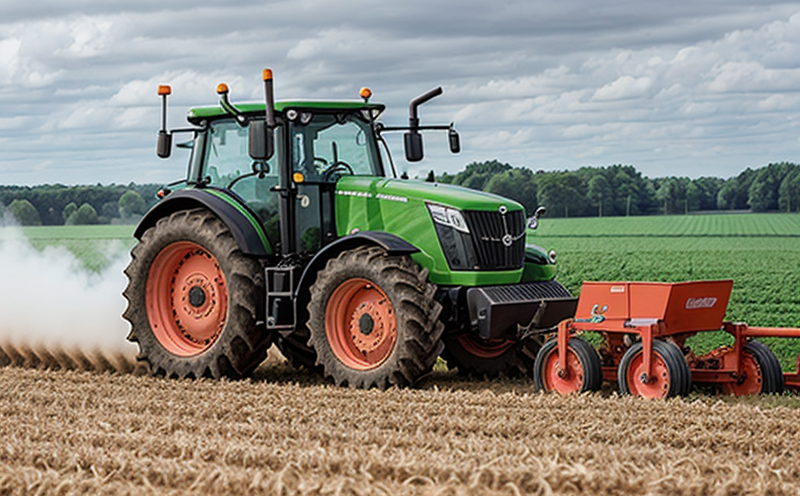Plough Draft Force Measurement Testing
The measurement of plough draft force is a critical aspect in the design and development of agricultural machinery and equipment. This testing ensures that the tools used in farming are optimized for efficiency, performance, and safety on the field. The primary focus here is to determine the resistance a plough encounters during the cultivation process. This involves measuring the force required to pull the plough through soil under various conditions.
The test setup typically includes a hydraulic or mechanical system that applies a controlled load to simulate real-world conditions. Instruments such as strain gauges, load cells, and pressure sensors are used to measure the draft force accurately. The tests can be conducted both in laboratory settings using simulators and on actual field trials where the equipment is tested under realistic operating conditions.
The data collected from these tests is crucial for several reasons:
- Product Design: It helps engineers refine the design of ploughs to ensure they are optimized for different soil types and field conditions.
- Performance Evaluation: The testing provides insights into how well the equipment performs under stress, which is essential for ensuring long-lasting durability.
- Safety Assurance: By understanding the forces involved, manufacturers can implement safety measures to prevent accidents during operation.
- Regulatory Compliance: Adhering to industry standards and regulatory requirements ensures that the equipment meets quality benchmarks and is safe for use in agriculture.
The testing procedure involves several key steps:
- Instrumentation Setup: Calibration of all measuring devices to ensure accuracy.
- Test Specimen Preparation: Ensuring the plough is in optimal condition for the test, including cleaning and inspection.
- Data Collection: Recording draft force under different operating conditions such as soil type, moisture content, and field incline.
- Data Analysis: Analyzing collected data to identify trends and areas for improvement.
- Reporting: Compilation of results into a detailed report that can be used by manufacturers and regulatory bodies.
The results from this testing are vital for the agricultural machinery industry as they directly influence product development, safety standards, and compliance with international regulations. Testing is conducted in accordance with various standards such as ISO 16840-5:2019 and ASTM E376-18.
| Industry Applications |
|---|
The measurement of plough draft force is widely used in:
|
Eurolab Advantages
At Eurolab, we offer comprehensive plough draft force measurement testing with a range of benefits:
- State-of-the-Art Facilities: Our laboratories are equipped with the latest technology and equipment for accurate measurements.
- Comprehensive Testing Capabilities: We provide a full suite of tests tailored to your specific needs, ensuring thorough evaluation of the equipment.
- Expertise in Standards Compliance: Our team is well-versed in international standards such as ISO and ASTM, ensuring that all testing aligns with global benchmarks.
- Accurate Data Reporting: We provide detailed reports that are reliable and easy to understand, supporting informed decision-making for your projects.
- Customer Support: Our dedicated team is available to assist you throughout the testing process, offering guidance and support as needed.
- Fast Turnaround Times: We pride ourselves on delivering results promptly to ensure minimal disruption to your project timeline.
With Eurolab, you can trust that we will deliver high-quality, accurate test results that meet the highest industry standards. Our commitment to excellence ensures that your agricultural machinery and equipment are tested rigorously and efficiently.
International Acceptance and Recognition
The testing of plough draft force is recognized internationally as a critical component in ensuring the quality and safety of agricultural machinery. The standards used for this type of testing, such as ISO 16840-5:2019 and ASTM E376-18, are widely accepted across various countries.
Many international regulatory bodies rely on these tests to ensure compliance with global safety and quality standards. This recognition extends beyond just the agricultural sector; it also impacts related industries such as manufacturing, engineering, and even environmental protection. By adhering to these internationally recognized standards, manufacturers can ensure that their products are not only safe but also meet the expectations of buyers worldwide.
The acceptance of these tests is further enhanced by the involvement of reputable testing laboratories like Eurolab. Our laboratory has been accredited by several leading bodies, including ISO/IEC 17025:2017, ensuring that our results are trusted and recognized globally. This accreditation guarantees that all our processes are conducted to the highest standards, providing confidence in the reliability of our test data.
The global nature of the agricultural machinery industry means that compliance with international standards is essential for manufacturers operating across borders. By conducting tests according to these internationally accepted protocols, we help ensure that your products meet the expectations of buyers and regulators worldwide. This not only enhances your brand's reputation but also opens up new markets and opportunities.





